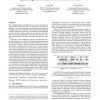Free Online Productivity Tools
i2Speak
i2Symbol
i2OCR
iTex2Img
iWeb2Print
iWeb2Shot
i2Type
iPdf2Split
iPdf2Merge
i2Bopomofo
i2Arabic
i2Style
i2Image
i2PDF
iLatex2Rtf
Sci2ools
137
click to vote
PLDI
2006
ACM
2006
ACM
Optimizing data permutations for SIMD devices
The widespread presence of SIMD devices in today’s microprocessors has made compiler techniques for these devices tremendously important. One of the most important and difficult issues that must be addressed by these techniques is the generation of the data permutation instructions needed for non-contiguous and misaligned memory references. These instructions are expensive and, therefore, it is of crucial importance to minimize their number to improve performance and, in many cases, enable speedups over scalar code. Although it is often difficult to optimize an isolated data reorganization operation, a collection of related data permutations can often be manipulated to reduce the number of operations. This paper presents a strategy to optimize all forms of data permutations. The strategy is organized into three steps. First, all data permutations in the source program are converted into a generic representation. These permutations can originate from vector accesses to non-contiguo...
Data Permutations | Permutation Instructions | PLDI 2006 | Programming Languages | Related Data Permutations |
| Added | 14 Jun 2010 |
| Updated | 14 Jun 2010 |
| Type | Conference |
| Year | 2006 |
| Where | PLDI |
| Authors | Gang Ren, Peng Wu, David A. Padua |
Comments (0)

